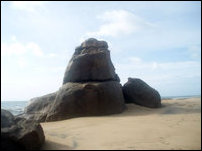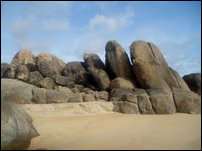Know the Etymology: 379
Place Name of the Day: Saturday, 22 November 2014
Kodduk-ki'na'ru, Kodduk-kal, Uppuk-koddu
கொட்டுக்கிணறு, கொட்டுக்கல், உப்புக்கொட்டு
Koṭṭuk-kiṇaṟu, Koṭṭuk-kal, Uppuk-koṭṭuKoddu+ki'na'ru
Koddu+kal
Uppu+koddu
The well walled by hollow wood
The block rocks or the barn/ hut-like rock
The salt storing barn or hut
| Ki'na'ru |
well (Tamil, Malayalam, DED 1998); related to Kea'ni: small tank, well, ditch, trench (Tamil, DED 1998); source of groundwater, source of water hidden below surface (Tamil, Ma'nimeakalai); Ki'ndu: (verb) to dig up, to burrow in (Tamil, DED 1542)
|
| Koddu 1 |
hollow trunk of a tree (Eezham Tamil): trunk of a palmyra palm (Eezham Tamil, MTL); Kotu: wood, canoe, which is usually dug out of a single trunk of a tree (Sinhala, Sorata); Kota: (plural) stump (Sinhala); Koddam: hollow piece of bamboo (Tamil, DED 2059); Kotta: bamboo tube (Kannda, DED 2059); Gottamu: tube, cylinder (Telugu, DED 2059); Koddan: mallet (Tamil, DED 2063, this could also have come from the verb Koddu meaning to pound); Kuttu: stem of a tree which remains after cutting it (Kannada, DED 1676); Kudai: anything hollow (Tamil, DED 1660): Koatara: hollow of a tree (Sanskrit, CDIAL 3496 traces Dravidian etymology); Koadu: tree (Tamil, Aingku'runoo'ru, 414); branch of a tree (Tamil, Ku'runthokai, 99: 4-5); anything stout, knot in a tree (Tamil, Puram, 164:1, 246: 11)
|
| Koddu 2 |
stout, fat, solid; from Kozhu: fat (Tamil, DED 2146); Ku'ndu: ball (Tamil, DED 1695); small hill (Tamil, DED 1682); Koddai: round and solid (Tamil usage) seed (Tamil, DED 2069)
|
| Koddu 3 |
shed, a small hut; variation of Koddam, Koddil (Koddu+il), Koddakai (Koddu+akam): shed, stall, hut (Tamil, DED 2058); Kottige: stall, barn, room (Kannada, DED 2058); Kota: cowshed (Gondi, DED 2058); cognates in 9 Dravidian languages; probably from a small, conical, thatched roof; Kotu: barn, granary (Sinhala, Sorata); Koddu: granary (Tamil, MTL); basket made of rattan (Tamil, DED 2060);
|
| Koddukki'na'ru |
a well walled with hollow palmyra trunks (Eezham Tamil, MTL); a shallow pit-well is sandy areas where a single, hollow, trunk of a tree make the wall of the well (Eezham Tamil, see image for example); U'raik-ki'naru: a well walled by terracotta rings placed one upon the other as U'rai (cover) for the sides. Such wells are commonly seen in archaeological sites (Tamil, Paddinappaalai, 176, DED 723)
|
| Uppu |
salt, alkali, saltiness (Tamil, DED 2674a); cognates in 13 Dravidian languages
|
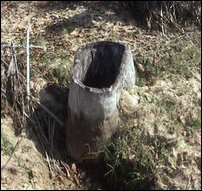
A Kodduk-ki'na'ru walled by hollow tree-trunk noticed at Cheaththu-thoduvaay, a coastal sandy area in Chu'ndik-ku'lam in the Vadamaraadchi East division of Jaffna district [Image courtesy: P. Pushparatnam, University of Jaffna]
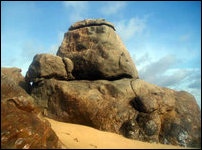
Block rocks at Kodduk-kal in Poththuvil division of Ampaa'rai district [Image courtesy: Munawfer, Google Earth]
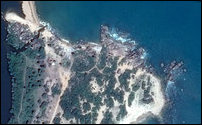
Satellite view of Kodduk-kal in Poththuvil division, showing the coastal rock blocks [image courtesy: Google Earth]
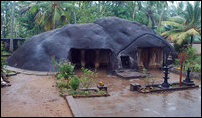
The rock-cut cave temple at Kottuk-kal in Kollam district, Kerala [Image courtesy: Kannan Shanmugam, Wikimedia Commons]
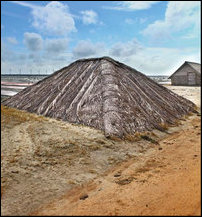
Storing salt by thatching the heap of salt. An example seen at a salt pan in Puththa'lam [Image courtesy: exploresrilanka.la]
The word Koddu, as a noun or adjective, is used in different senses of meaning in Tamil. It means a hollow trunk of a tree; it means a trunk or log of a palmyra palm; it means anything stout and it also means a hut.
Koddu in its hollow trunk meaning in Eezham Tamil corresponds to Koddam and Kudai in Tamil/ Dravidian (DED 2059, 1660), Kotara in Sanskrit/ Indo-Aryan, where the etymology is traced to Dravidian (CDIAL 3496) and Kotu in Sinhala for a dugout canoe.
Koddu meaning a log in Eezham Tamil corresponds to Koadu meaning tree in Tamil, Kuttu meaning stem in Kannada/ Dravidian (1676) and Kota meaning stump in Sinhala.
The stoutness or solidness meaning of Koddu is related to other Tamil/ Dravidian forms Kozhu (DED 2146), Ku'ndu (DED 1645) and Koddai (DED 2069)
In meaning a hut or barn, Koddu in Eezham Tamil is a cognate of Koddil, Koddam and Koddakai in Tamil/ Dravidian (DED 2058) and Kotu meaning a barn or granary in Sinhala.
Kodduk-ki'na'ru as a phrase in Eezham Tamil means a well walled by hollow tree-trunk or trunks. Such wells are usually shallow and are mostly found in sandy coastal tracts. The phrase is comparable to the usage Uraik-ki'naru found in Changkam literature, meaning a well walled by terracotta rings or bottomless jars placed one upon another. Such wells are commonly found in archaeological sites.
Ki'na'ru, meaning a well in Tamil/ Dravidian (DED 1998), is related to the verb Ki'ndu meaning to burrow (DED 1542) and to another Tamil word Kea'ni (DED 1998) meaning a constructed and walled pond or large well that is a source of underground water.
In the place name Kodduk-kal in the Eastern Province, Koddu obviously means either stout blocks, or a feature resembling a hut/ barn, as the place is found with conspicuous coastal rock blocks and one of them resembles a hut or barn. The place name is comparable to Kottuk-kal in Kollam, Kerala.
See earlier columns on the Tamil/ Dravidian etymology of Kal, meaning stone, rock, boulder, rocky hill etc.
In the place name Uppu-koddu in Batticaloa, the suffix means a hut-like barn or structure for storing salt. Such storage facilities, thatched by coconut or palmyra palm leaves are commonly found in the saltpans. A similar place name Panagkaddik-koddu (Panang-kaddi: palmyra jaggery) confirms the production or storage structure meaning of the word Koddu,
Uppu is a common Tamil/ Dravidian word meaning salt (DED 2674a)
* * *Well walled by hollow objects such as terracotta rings:“U'raik-ki'nattup pu'ragn cheari” (Paddinappaalai, 176)
“உறைக்கிணற்றுப் புறஞ் சேரி” (பட்டினப்பாலை, 176)
The out-lying hamlet (of the port city of Kaavirippoom-paddinam) found with wrapped (terracotta-ring-walled) wells
Koddil meaning a hut:“Ku'rugnchaaddu uru'laiyodu kalappai chaarththi nedugnchuvar pa'raintha pukai choozh koddil” (Perumpaa'naattuppadai, 188-189)
“குறுஞ்சாட்டு உருளையொடு கலப்பை சார்த்தி நெடுஞ்சுவர் பறைந்த புகை சூழ் கொட்டில்” (பெரும்பாணாற்றுப்படை, 188-189)
The smoky hut, the tall walls of which are worn out by keeping levelling rollers (an agricultural implement) and ploughs leaning against them
* * *Kodduk-ki'na'ru or
Kodduk-ki'naththadi is a locality in Kalmunai of Ma'n'niththalai, in the Poonakari division of Ki'linochchi district. Also called
Koddup-pa'nivu, the place is located in the coastal sand dunes.
A locality name Kodduk-ki'naru is associated with a Pi'l'laiyaar temple in Ariyaalai East in Jaffna district, which is a sand bar on the opposite coast of the Ma'n'niththalai sandbar noted above. The temple is known as
Kodduk-ki'na'ru Pillaiyaar or
Koddukk-kinattadip Pi'l'laiyaar.More locality names
Kodduk-ki'na'ru could be found in Kumizhamunai, in the Karaithu'raippattu division of Mullaiththeevu district, and Ki'laali in Pachchilaippa'l'li division of Ki'linochchi district. Both are coastal and sandy places.
Kodduk-kal is a coastal place of boulder rocks in Poththuvil division of Ampaa'rai district. One prominent rock here is shaped like a hut or barn. A place in Kollam district of Kerala, where a rock-cut shrine is scooped out of a boulder rock is also called Kodduk-kal.
Uppuk-koddu is a place in Koara'laippattu division of Batticaloa district
* * *Some related place names:Koddu:Koddoadai: Koddu-oadai: The pond walled by tree trunks; Vadamaradchi East division, Jaffna district
Karik-kodduk-ku'lam: The pond walled by dark tree trunks; or the tank of darkened tree trunks standing in it; Poonakari division, Ki'linochchi district
Kodduk-ku'lam: The pond walled by tree trunks; a locality near Kokkuvil in Batticaloa, Ma'nmunai North division, Batticaloa district (One Inch Sheet)
Kodduk-ki'na'ru-ku'lam: The tank in the locality of the tree-trunk-walled well; Welikanda, Batticaloa district (Vakaneri One Inch sheet)
Oomaichchiyaa-koddu-ve'li: The open land of the tree-trunk-walled well named after a dumb women; Karaithu'raippattu division, Mullaiththeevu district
Koddadi: The locality of a tree-trunk well; or from Koaddai-adi: the locality of the fort; Jaffna city, Jaffna district
* * *Koddu as barn or storage shed:Panang-kaddik-koddu: The barn or storage shed to keep palmyra jaggery; Mannaar Town division, Mannaar district
* * *Ki'na'ru:Ki'na'r'radi-pa'l'lam: The shallow area having a well; or the shallow area in the locality of the well; Ki'n'niyaa division, Trincomalee district
First published: Saturday, 22 November 2014, 15:21
Previous columns:








